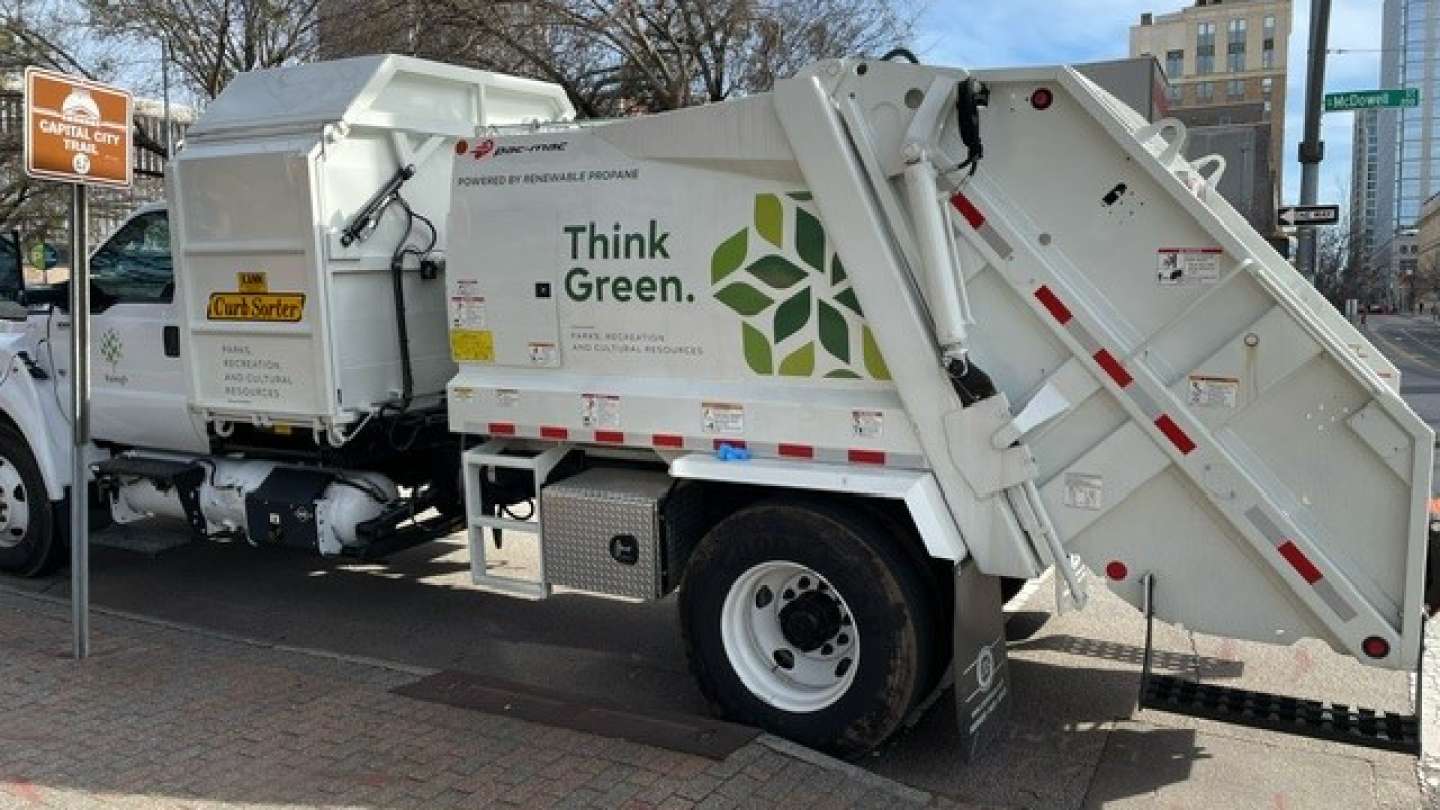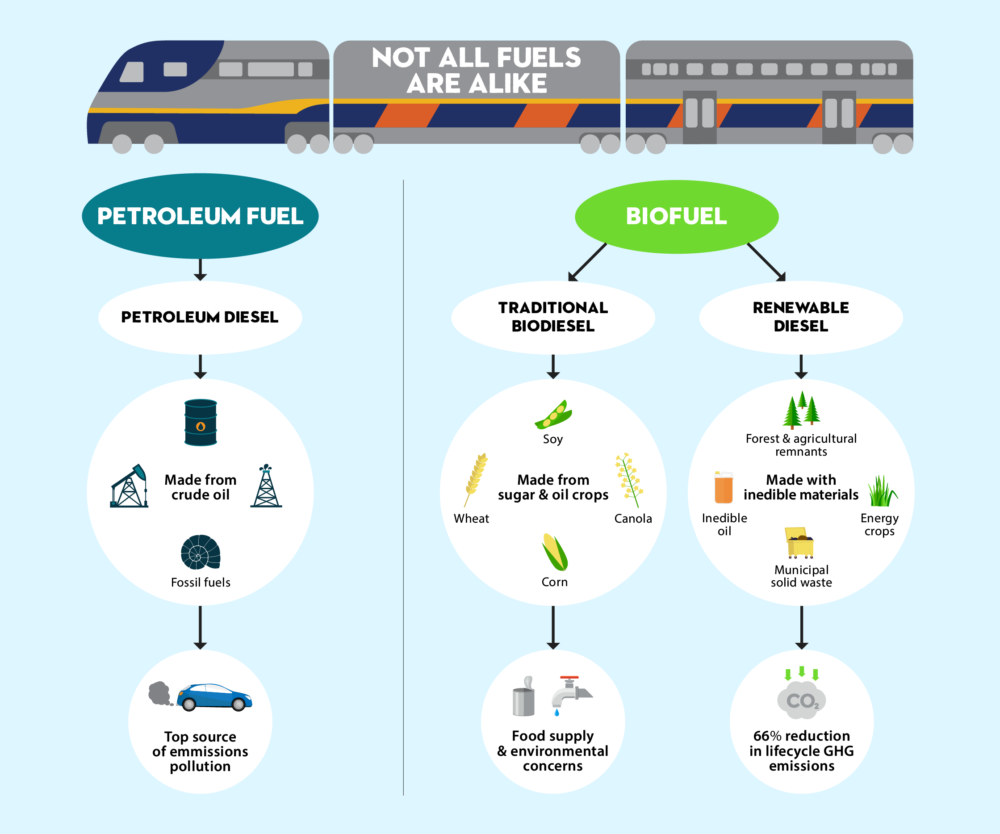
Alternative Fuel in Action
As cities across the country seek innovative ways to reduce emissions and transition toward cleaner energy solutions, renewable diesel has emerged as a game-changing alternative fuel. One of the most widely used forms is R99 renewable diesel, which is made from repurposed animal fats, secondhand cooking oil, and agricultural waste. The "R99" designation means it is 99% renewable diesel, with the remaining 1% typically consisting of performance-enhancing additives. Unlike biodiesel, R99 is chemically similar to petroleum diesel, allowing it to be used in existing diesel engines without modifications while offering a cleaner-burning, lower-emission alternative. This makes it an ideal choice for fleets looking to reduce their carbon footprint without disrupting operations.

Across the country, governments are making ambitious commitments to cleaner transportation. New York City, for example, is transitioning its entire municipal fleet to renewable diesel—becoming the first major East Coast city to do so on a large scale. The city’s Department of Citywide Administrative Services (DCAS) has already begun replacing fossil diesel in its heavy-duty and off-road vehicles, including garbage trucks, ambulances, and emergency generators. This shift is a critical part of New York’s broader strategy to cut greenhouse gas emissions by 50% by 2035 and reach an all-electric fleet by 2038.
Right here in North Carolina, municipalities are also taking action. The City of Raleigh has become the first in the Southeast to adopt R99 renewable diesel, setting an example for other local governments in the region. Durham has also begun incorporating renewable diesel into its operations, signaling growing momentum for alternative fuels across the Triangle. To better understand how this transition came to life, we connected with the City of Raleigh’s Fleet Management team. They answered questions about their motivation, challenges, outcomes, and advice for other municipalities considering a move to alternative fuels.
Why Raleigh Chose Renewable Diesel
The City of Raleigh’s motivation to switch to renewable diesel was clear:
"The City of Raleigh was motivated by the desire to reduce greenhouse gas emissions, improve air quality, and embrace sustainable practices that align with our environmental goals," said the City’s Fleet Operations team. "Renewable diesel (R99) offers a cleaner alternative to traditional diesel, contributing to public health and environmental benefits."
To determine the best alternative fuel, Raleigh evaluated several factors, including emissions reductions, cost-effectiveness, compatibility with existing infrastructure, and fuel availability. R99 stood out as a high-performing, low-emission option that aligned with the city’s sustainability goals.
Implementing Renewable Diesel in Raleigh’s Fleet
Transitioning to renewable diesel required careful planning and collaboration across city departments. The process included:
- Assessing the fleet to determine which vehicles could use R99.
- Securing a reliable supplier that could meet the city’s fuel demand.
- Training staff on handling and utilizing the fuel efficiently.
While securing a supplier posed some challenges, the city overcame hurdles related to price stability, logistics, and fuel storage to successfully implement R99.
Environmental & Performance Benefits
The National Renewable Energy Laboratory (NREL) indicates that R99 can reduce greenhouse gas emissions by up to 80% compared to petroleum diesel (NREL, 2022). Additionally, data from Neste suggests that renewable diesel can lower lifecycle emissions by up to 95% depending on the feedstock used (Neste, 2025).
Beyond emissions reductions, R99 provides additional benefits such as:
- Cleaner-burning fuel, leading to improved air quality.
- Reduced engine wear, potentially extending vehicle lifespan.
- Lower maintenance costs, thanks to improved fuel efficiency.
This comes at a time when U.S. renewable diesel capacity is expanding rapidly, reaching approximately 4.3 billion gallons per year as of early 2024, up by 1.3 billion gallons from the year before (U.S. Energy Information Administration, 2024). The increased availability makes it easier for various fleets to pursue widespread adoption.
Further emphasizing this momentum, a coalition of U.S. oil and biofuel groups recently urged the Environmental Protection Agency (EPA) to increase the federal biomass-based diesel blending mandate to 5.25 billion gallons by 2026.
Currently, Raleigh has prioritized heavy-duty vehicles such as buses, garbage trucks, and high-mileage fleet vehicles for the transition to R99, as these vehicles consume the most fuel and contribute the most to emissions.
"While we are still waiting to see the long-term effects, data suggests that renewable diesel can lead to less engine wear due to its cleaner burn characteristics, potentially prolonging engine life and reducing maintenance costs," the city explained.
Raleigh’s Role as a Regional Leader
Raleigh’s commitment to renewable diesel has been well received by the community.
"The community has responded favorably, appreciating our commitment to sustainability and improved public health initiatives," said city officials. "Increased awareness around renewable fuels has encouraged public discourse on environmental issues."
The city also sees itself as a model for other municipalities in the Southeast looking to reduce emissions in their fleets.
"Yes, Raleigh's initiatives can serve as a model for other municipalities in the Southeast. It showcases the practicality and benefits of adopting renewable fuels to address environmental challenges," the city noted.
And Raleigh’s leadership is already sparking interest in the region. Officials believe their example can pave the way for other municipalities to follow suit. Their efforts also reflect a larger national trend. For instance, U.S. imports of renewable diesel are growing, with an average of 30,000 barrels per day imported during the first five months of 2024—nearly matching monthly records (U.S. Energy Information Administration, 2024). As the demand for renewable diesel continues to grow, so does the readiness to expand adoption.
Looking to the Future
Raleigh is already exploring ways to expand the use of renewable diesel across more departments and vehicle types as part of its long-term sustainability strategy. Additionally, the city is investigating other alternative fuel options, such as electric vehicles, compressed natural gas (CNG), and biofuels, to further reduce emissions and increase energy independence.
For other municipalities considering a transition to renewable diesel, Raleigh’s advice is clear:
"Be the change you want to see!" Raleigh’s fleet team emphasized. "Receiving support from local authority heads, like department leaders and city managers, is always a great boost as well!"
By adopting R99 renewable diesel, Raleigh has taken a major step toward reducing its carbon footprint and promoting cleaner air. As the first city in the Southeast to embrace this alternative fuel, it sets a powerful example for municipalities looking to transition to more sustainable fleet operations.
With continued investment in alternative fuels and clean energy, Raleigh’s leadership in sustainability will inspire other cities to follow suit.
